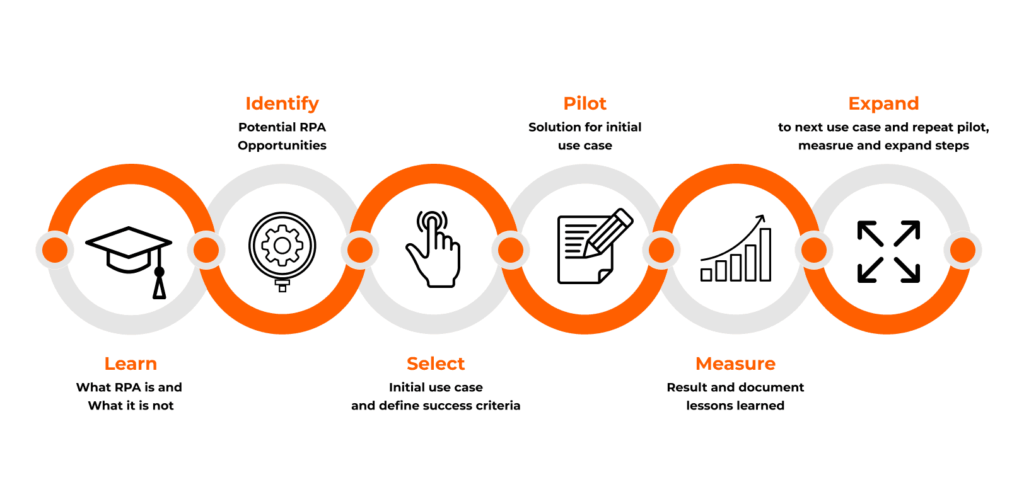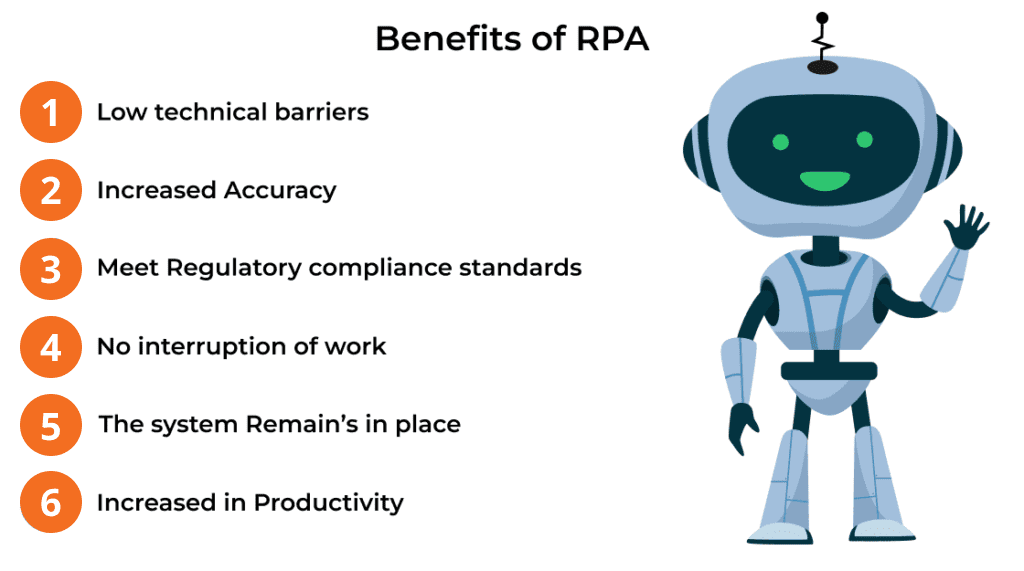- What is Robotic Process Automation (RPA)
- Evolution of RPA
- What is 6 step RPA
- Benefits of RPA from organization’s perspective
- Applications of RPA
- Business Processes in which RPA cab be used
Let me briefly explain the purpose of this blog before we get started, as well as what readers can expect learning from it.
What is Robotic Process Automation (RPA)-
Automation is a business automation process that has made building, deploying, and managing software easier with all of the artificial intelligence. In other words, it is the process by which a software bot uses a metaphorical combination of automation, computer vision, and machine learning to automate repetitive and high-volume tasks. It is nothing more than instructing a machine in a specific way with sequences and logics to perform several tasks at the same time.
Evolution of RPA-
The phrase ‘Robotic Process Automation (RPA)’ dates back to the early 2000s, when the concept of robots working for humans was evolving and turning strongly into bots automating everything, despite the fact that the original and initial development of automation began in the early 1990s and later advanced with artificial intelligence and machine learning.
What is 6 step RPA-
The ideal method for adopting RPA is a 6-step methodology, which is effective and improves the overall operational efficiency of the system.
- Be practical and keep your expectations realistic
- Determine proper use of RPA solutions
- Involving the management right from the outset
- Keep an eye on early advantages
- Know how business process management works hand-in-hand with RPA
- Be prepared for radical changes

Benefits of RPA- From organizations perspective
The following are some of the noteworthy benefits of RPA from the standpoint of organizations.
- Robotic Process Automation technology helps organization in digital transformation of company’s data and other things
- It helps in enabling better communication and better customer service management
- It ensures standardization of operations and business processes followed by any company
- It ensures standardization of operations and business processes followed by any company
- It helps in improving efficiency and productivity
- It reduces manual efforts and automate the system, hence increases the proficiency of the system
- It increases the accuracy level of the tasks and other business processes
- It is highly reliable and highly consistent, as it is decreasing human dependencies.

Applications of RPA-
Given its accuracy and consistency, it is currently widely used in a variety of industries, including the following.
- Data integration and data migration
- Health sector, in making most of health sector digitally sound
- Used in marketing and sales process- Inventory and supply
- Educational industry process
- Banking and finance sector- Procure –to-pay
- Supply chain management
- Email automation process
- Pharmaceutical industry process
- Process lists and storage of data
- Conversion of unstructured data into structured and meaningful data by graphics
- Used by insurance companies for managing work processes and managing customer’s data
- Used for extraction and validation of data
RPA used in various business processes
Organizations can utilise RPA for improved management, which leads to system scalability and adaptability. The following are the primary business operations that can benefit from RPA-
1. Invoice Processing
Sending and receiving bills is a fundamental function of all firms, regardless of industry or size. When invoices are received, RPA can be programmed to automatically process them. This way, the programme can automate the data, reconcile problems, and work out specific judgments that must be made during the invoice processing process. This reduces the need for human labour while also making it easier to keep track of all bills.
2. Procure-to-Pay
Despite the fact that most businesses have a centralised procurement department with defined processes throughout the company, processes are not always managed. It is a combination of manual and computerised systems including multiple steps to execute a single order, and there may be several variations from the actual process to fit certain eventualities, making the entire process difficult. Adopting RPA helps streamline the process, allowing for more proficiency and ensuring that transactions are well aligned by consistent data. RPA may efficiently streamline the P2P process, providing improved accuracy, consistency, and higher productivity, from managing a Vendor Master to Sourcing and Contracting, Purchase Order procedure, Receiving Goods, and Payments.
3. Data Queries
A system query is a technique that is used by several programmes to obtain data for a certain transaction. RPA solutions can be used to restructure data integration between different apps and portals, providing employees with quick access to the data they need for various activities.
4. Human Resources
Automation in the HR department has enormous potential to improve the efficiency of the system and procedures. RPA solutions can assist in rapidly and precisely locating personnel details, which might be a time-sensitive procedure. Automation will also aid in the replacement of paper procedures with e-forms and online apps, facilitating your digital transformation journey. RPA robots can also manage attendance, leave permission, timesheets, and other tasks.
4. Security of data
It can be very valuable for data security. As digitization grows, the security of data and personal concerns is at risk, but RPA may be used to secure user data, provide high level security to users, and aid in the security of an organization’s private data.
If you want to learn more such topics or if you need software consulting, please contact us at info@ignatiuz.com.
